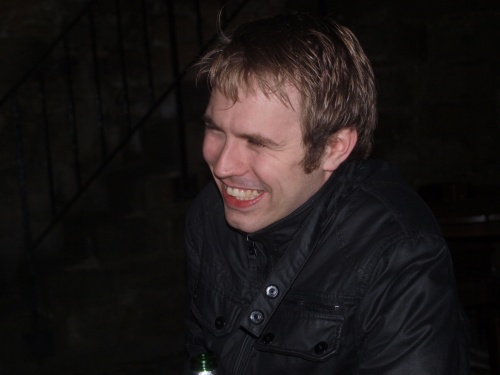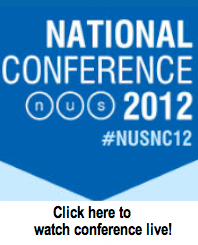By Sam Creighton
The delegates have voted, the count has been verified and the results have been announced. Liam Burns is NUS President for 2011/12. Two days seem to have really taken it out of the normally energetic Scotsman. While obviously jubilant he looks more subdued than when The Delegate interviewed him on Monday evening.
“There’s that small thing of the Scottish elections that we have on our doorstep” he replied when asked what he would be doing next, “so my focus will swing firmly back onto Scotland post-Conference.” That’s not to say that he will wait until he officially takes over on July 1st to get the ball rolling on his manifesto pledges. “After May 6th I want to start getting a move on getting an authoritative stance on not just how institutions should be funded but how students should be funded.” He’s also thinking about the long game and is planning to meet with the TUC so they can start building towards 2014 together.
Burns is not the usual NUS President, he certainly describes himself as the anti-establishment candidate. While he is taking on the mantle of the 55th President of the NUS, he is only the 13th to come from the Nations. His victory is also a bit of a coup, with even Burns himself admitting that Shane Chowen was the favourite coming into the Conference. He identified what he thinks was the turning point: “I think it was that people recognised that while I think Aaron has achieved some amazing things and that the organisation has made so many right calls, there have been some that we made wrong. I think what delegates saw was that I was being honest about that and trying to tackle that head on. Shane simply was part of those decisions.”
It’s been an unusual election for Presidency this year, with what is traditionally seen as a mere coronation, being too close to call right up until the end. Burns has nothing but praise for his opponents: “Every single candidate on that stage was credible. I don’t agree with everything that was said, but in terms of their legitimacy, and that made the election a positive and enjoyable thing.”
Burns thinks there are a lot of great ideas he can take from his opponents, he is particularly excited about Chowen’s idea of a young people’s commisision and his vision on how to turn NUS into an organisation directed by it’s individual members rather than Union officers.
His victory was secured by the left, it was the second preferences he received after Mark Bergfeld was excluded that pushed him over the top. “What I think people like Mark recognise is that I’m someone who will respect them, who will want to hear their views. We’ll have robust discussions, we won’t always agree but what’s different now is that there’s far more common ground in the issues we’re working on that we now need to occupy than there was ten years ago.”
Burns has talked a lot this campaign about how he doesn’t think there are the parliamentary mechanisms in place to bring about major changes, but there are certain things he is determined to achieve; an authoratatitive position on student support and a more united movement: “I don’t want to be to-ing and fro-ing in the pages of The Guardian between Michael Chessum and myself week on week. I hope that we will demonstrably have show that the public are still behind us in our campaign to reverse the decisions made both in public funding and also the fees regime that we currently have.”
Conducting this interview in a Dannie Grufferty shirt, Liam has a clear idea of who he wants in his team. He is backing Ed Marsh for Union Development, Usman Ali for Higher Education, Grufferty for Society and Citizenship and Toni Pearce for Further Education. “Equally exciting is the Liberation Officer elections that are coming up in the next few weeks. There are some brilliant candidates going for them. It will be a while before I see who the whole team is but I’m sure there will be some great talent.”
Will we be seeing more t-shirts with Liam’s name on next Conference? “I honestly don’t know if I’ll re-run. I’ll have to think long and hard about the timing because you could give a President a run-up to the general elections if I didn’t run for another year but if there’s anything I learnt off Aaron it’s that twelve months can change a lot.”


